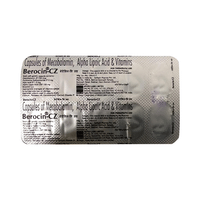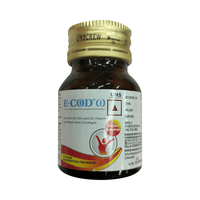Trovafin 10mg/160mg/5mg Tablet

Rs.58.20for 1 strip(s) (10 tablets each)
food interaction for Trovafin
alcohol interaction for Trovafin
pregnancy interaction for Trovafin
lactation interaction for Trovafin
food
alcohol
pregnancy
lactation
Trovafin 10mg/160mg/5mg Tablet may be taken with or without food, but it is better to take it at a fixed time.
None
None
CAUTION
It is unsafe to consume alcohol with Trovafin 10mg/160mg/5mg Tablet.
UNSAFE
Information regarding the use of Trovafin 10mg/160mg/5mg Tablet during pregnancy is not available. Please consult your doctor.
CONSULT YOUR DOCTOR
Information regarding the use of Trovafin 10mg/160mg/5mg Tablet during breastfeeding is not available. Please consult your doctor.
CONSULT YOUR DOCTOR
SALT INFORMATION FOR Trovafin
Atorvastatin(10mg)
Uses
Atorvastatin is used in the treatment of high cholesterol.
How it works
Atorvastatin is a lipid-lowering medication (statin). It works by blocking an enzyme (HMG-CoA-reductase) that is required in the body to make cholesterol. It thus lowers "bad" cholesterol (LDL) and triglycerides, raising the level of "good" cholesterol (HDL).
Common side effects
Increased glucose level in blood, Indigestion, Diarrhea, Fever, Increased creatine phosphokinase (CPK) level in blood, Joint pain, Nasopharyngitis (inflammation of the throat and nasal passages), Nausea, Pain in extremities, Urinary tract infection, Abnormal liver function tests, General discomfort, Hepatitis (viral infection of liver), Muscle damage, Rhabdomyolysis, Immune-mediated necrotizing myopathy
Fenofibrate(160mg)
Uses
Fenofibrate is used in the treatment of high triglycerides and high cholesterol.
How it works
Fenofibrate is a lipid lowering medication. It works by lowering the levels of triglycerides and "bad" cholesterol (LDL), while raising the levels of "good" cholesterol (HDL).
Common side effects
Increased liver enzymes, Nausea, Vomiting, Flatulence, Abdominal pain, Diarrhea, Headache, Back pain, Muscle pain, Increased creatine phosphokinase (CPK) level in blood, Inflammation of the nose, Rash, Urticaria, Muscle spasm, Muscle weakness, Gallstones, Low blood platelets, Pancreatic inflammation, Pulmonary embolism, Deep vein thrombosis (blood clot in the legs), Anemia (low number of red blood cells), Hypersensitivity, Photosensitivity, Muscle damage, Rhabdomyolysis, Hepatitis (viral infection of liver), Acute renal failure
Folic Acid(5mg)
Uses
Folic Acid is used in the treatment of anemia due to folic acid deficiency.
How it works
Folic Acid is a form of vitamin B. It plays a vital role in the formation of red blood cells, which carry oxygen throughout the body. It is also essential in pregnancy due to its role in the development of the unborn baby's brain and spinal cord.
Common side effects
No common side effects seen
SUBSTITUTES FOR Trovafin
1 Substitutes
1 Substitutes
Sorted By
 Rs. 111pay 86% more per Tablet
Rs. 111pay 86% more per Tablet
Expert advice FOR Trovafin
- In general, Atorvastatin is safe. It may cause diarrhea, gas or an upset stomach. If any of these happen to you, take it with food.
- Inform your doctor if you experience fatigue, muscle weakness or muscle pain.
- Your doctor may check your liver function before starting the treatment and regularly thereafter. Inform your doctor if you notice signs of liver problems such as stomach pains, unusually dark urine or yellowing of skin or eyes.
- Inform your doctor if you have kidney disease, liver disease or diabetes before starting treatment with this medicine. If you are diabetic, monitor your blood sugar level regularly as Atorvastatin may cause an increase in your blood sugar level.
- Do not take Atorvastatin if you are pregnant, planning a pregnancy or breastfeeding.
Frequently asked questions FOR Trovafin
Atorvastatin
Q. What should I know about high cholesterol?
Cholesterol is a type of fat present in your blood. Total cholesterol is determined by the total amount of LDL and HDL cholesterol in the body. LDL cholesterol is called “bad” cholesterol. Bad cholesterol can build up in the wall of your blood vessels and slow or obstruct blood flow to your heart, brain, and other organs. This can cause heart disease and stroke. HDL cholesterol is called “good” cholesterol as it prevents the bad cholesterol from building up in the blood vessels. High levels of triglycerides are also harmful to you.
Q. Is Atorvastatin used for lowering cholesterol?
Atorvastatin belongs to a group of medicines known as statins, which lowers the level of lipids or fats. Atorvastatin is used to lower lipids known as cholesterol and triglycerides in the blood when a low-fat diet and lifestyle changes fail to lower the levels of cholesterol and triglycerides. If you are at an increased risk of heart disease, Atorvastatin can also be used to reduce such risk even if your cholesterol levels are normal. You should maintain a standard cholesterol-lowering diet during treatment.
Q. Will taking Atorvastatin lead to an increase in my risk of diabetes?
If you are at high risk of developing type 2 diabetes, taking Atorvastatin may increase this risk slightly. This is because Atorvastatin can raise your blood sugar a little. If you already have type 2 diabetes, your doctor may advise monitoring your blood sugar levels more closely for the first few months. Tell your doctor if you find it harder to control your blood sugar.
Fenofibrate
Q. When should Fenofibrate be taken?
Usually, Fenofibrate is taken once daily with a meal. The initial dose of the medicine will depend on the type and age of the patient. Consult your doctor before you start taking the medication and follow the instructions as provided.
Q. Does Fenofibrate raise blood pressure?
There is no or negligible effect on blood pressure in patients with normal blood pressure levels. However, Fenofibrate may lead to a decrease in blood pressure in patients with high blood pressure.
Q. Can Fenofibrate cause kidney problems?
Fenofibrate should be used with caution in patients with kidney disorders. Serum creatinine levels may increase with long-term usage of Fenofibrate but is completely reversible. The evidence of kidney damage with this medicine is rare still the kidney function blood test should be done regularly if there is a possibility of kidney damage. Consult your doctor before taking the medicine. Inform the doctor if you have had any disease and all the medicines that you are taking for a better diagnosis and treatment.
Folic Acid
Q. Is it ok to take Folic Acid when not pregnant?
Usually, folic acid requirements are met from the diet and therefore additional supplements are not required. In general, Folic Acid is recommended only when you have a deficiency of folic acid. However, Folic Acid is advised to women who are pregnant and who want to conceive. The medicine should be taken at least 4 weeks before pregnancy and should continue its use up to 3 months of pregnancy. Consult your doctor if not sure.
Q. Can Folic Acid cause weight gain?
Animal studies on Folic Acid suggest that taking the medicine in excess along with a high-fat diet may lead to weight gain and fat accumulation. But this weight gain was not evident when taken along with a normal or low-fat diet, even with excess Folic Acid. In humans, similar studies have not been conducted and therefore knowledge regarding weight gain is lacking. Therefore, if you are on Folic Acid eat a low-fat meal to be on the safer side.
Q. How long does Folic Acid take to work?
Folic Acid usually starts working within a few hours of taking it. If you are taking it for iron deficiency anemia, you may start feeling better after a few weeks of taking it. In case you are taking it during pregnancy, you may not notice any difference but this does not mean that the dose is not working. Continue taking Folic Acid for the duration recommended by your doctor.





















